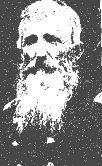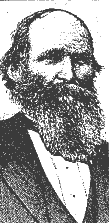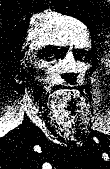|
DECATUR
had the distinction of furnishing five generals
to the nation in the Civil war. Besides
these, it gave many lesser officers who
performed noble service and whose valor will
always be remembered. Some of them made
the supreme sacrifice, giving up their lives to
the cause.
The story of General
Richard J. Oglesby, who became major-general
in the army is told in another chapter.
When Oglesby was named
colonel of the Eighth Regiment he found himself
in command of his old time friends, companions,
neighbors, men who were used to calling him
"Dick". He recognized the importance of
making them realize that they were soldiers and
under his command. One day he said to
them:
"I've no doubt that most of
you think you know as much about how this thing
should be run as I do, and I expect you do, but
you have chosen me and I have been commissioned
by the governor to run it and I am going to do
it to the best of my ability, so help me God.
You are no longer mere men. You are
soldiers. Your uniform marks you as part
of the United States government. Your
captain's uniform marks him as your superior,
even though he once may have been your
bootblack. Your duty is to obey orders,
whether you think they are right or not.
Your officers will do the thinking.
Oglesby proved himself a
capable and wise leader of men, and his
promotion to higher posts of service was not
surprising.
ISAAC C. PUGH
General Isaac C. Pugh
had already made a record in war service during
two wars, the Black Hawk struggle and the war
with Mexico, before the country found itself in
the throes of the Civil war. He was ready
at the first instant to take up arms, for the
third time, for his country.

ISAAC C. PUGH
He was among the first to
enlist when recruiting began, and he was made
captain of Company A of the Eighth regiment.
As soon as the three months enlistment was ended
Captain Pugh came home and organized the
Forth-first regiment, over which he was
appointed colonel. He was conspicuous for
his bravery, and eventually was advanced to the
rank of brigadier-general.
GUSTAVUS A. SMITH
Gustavus A. Smith was
operating a buggy factory in Decatur when he was
called into his country's service.1
He at once began to train men, and so successful
was he that he was called to Mattoon and
Springfield to drill soldiers. On May 6,
1861, he was asked to take command of a
regiment, and this regiment for six months was
known as Colonel Smith's Independent Regiment.
Later it became the Thirty-fifth Illinois
Infantry.

GUS A. SMITH
At the battle of Pea Ridge
Colonel Smith's horse was shot from under him
and he was badly wounded. In September,
1862, President Lincoln commissioned him
brigadier-general for his meritorious service.
After he recovered somewhat from his wounds he
asked to be assigned again to active duty but
was refused on account of his condition, and he
was given the appointment of provost general
marshal for Illinois. These orders later
were countermanded by the war department and
General Smith was asked to organize a
convalescent camp near Murfreesboro. Fifty
thousand men were being cared for at this camp
at the time it disbanded. In December
General Smith was mustered out, but he
continued in various military activities until
1866. After the war was over General
Smith moved to Tennessee and later to
Alabama. He was offered the Republican
nomination for congress but declined.
However, he served as a member of the state
board of education and board of regents, and in
1870 was named United States collection and
distribution agent for New Mexico.
JESSE H. MOORE
General Jesse Hines Moore
came of a line of fighters, his father, uncles
and grandfather having been soldiers in other
wars. He entered the Methodist church
ministry and became widely known and popular as
a preacher and patriotic speaker.

JESSE H. MOORE
As colonel of the One Hundred
Fifteenth regiment, Mr. Moore showed tact
and courage. At Chicamauga his regiment,
after exhausting its ammunition, drove the enemy
back by a bayonet charge led by Colonel Moore.
To recognize that act of bravery the government
placed a monument on Snodgrass hill.
Colonel Moore was
given the rank of brigadier-general by President
Lincoln in April, 1865.
The men and officers of his
regiment presented him a beautiful engraved
sword at Resaca, Ga., as a token of their
regard. This sword was given, after
General Moore's death, to his son, Rear
Admiral C. B. T. Moore of the United
States navy.
General Moore's
service for the country did not end with the
war. He served in Congress two terms.
In 1873 he was appointed United States pension
agent at Springfield and held that office four
years. In 1881 he was named United States
consul to Callao, Peru. There he fell a
victim to yellow fever, and he passed away on
July 11, 1883. He was temporarily buried
at Callao, but in 1885 the body was brought back
to Decatur and buried in Greenwood.
HERMAN LIEB
General Herman Lieb
was a resident of Decatur only a few years but
during that time he made a favorable impression
on the community. He was a man of culture
and literary tastes, as well as a patriot.
When he came to Decatur in
1856 he took up the study of law. When war
broke out he enlisted in the Eighth Illinois
regiment. In three months he became a
captain, later was appointed major, then a
colonel, and in March, 1865, he was made
brigadier-general.
He war career was
distinguished by his leadership of the colored
troops. It took the utmost courage at that
time to accept such a charge. Not only was
he in great danger from the Confederates, but he
was scorned by his fellow soldiers and officials
of the Union Army. Yet his colored troops
under his leadership performed so valiantly in
the war that he won the respect and admiration
of all.
When President Lincoln
asked for organization of colored troops, there
was much prejudice against the idea, but Major
Lieb
believed the negroes could be made into good
soldiers and he resigned his place as major and
accepted the colonelcy of a colored regiment.
After an attack by 2,500 Texas Rangers and 200
cavalry under the confederate general
McCulloch, in which the negroes resisted the
charge, there was no question as to whether or
not the negroes could fight.
In reporting that battle the
confederate general said:
"This charge was resisted with obstinacy by the
negro portion of the enemy's forces, while the
white portion ran like whipped curs almost as
soon as the charge was ordered."
General Lieb was
wounded in that battle.
Soon afterwards he
reorganized his regiment to go to the defense of
Vicksburg, recruiting new men and adding the
remnant of the Ninth Louisiana infantry.
The new organization was known as the Fifth U.S.
Heavy artillery, colored.
After the war was over
General
Lieb went to Springfield and started a
German newspaper. Later he moved to
Chicago, and there he died in 1908.
JAMES P. BOYD
Colonel James P. Boyd
was one of seven Decatur lawyers. who left law
practice to go to the front, and he was one of
three to give up his life. He enlisted in
the One Hundred
Sixteenth regiment, and he made
lieutenant colonel.
At the battle of Champion
Hills he was shot through the lungs. That
was in May, 1863. He never recovered from
those wounds. In 1864 he went to New
Orleans, hoping to improve his health, but he
grew worse and returned to Decatur, where he
died in October, 1869. He is buried in
Greenwood.
THE TUPPERS
Two of Decatur's most honored
heroes of the war were the two Tupper
brothers, Ansel and Nathan W., both of whom lost
their lives, Ansel at the battle of Shiloh, and
Nathan at home from disease brought on by
exposure. To show their love and esteem
for these courageous men, the citizens of
Decatur erected a shaft of granite at their
graves in Greenwood cemetery.
The Tuppers came to
Decatur in 1854 and began the practice of law.
Ansel was the first to enlist when war
came, and he became lieutenant colonel of the
Forty-first regiment.
After Ansel's death on April
6, 1862, his brother Nathan undertook the care
of Ansel Tupper's children. But the
country was needing more men and Nathan, too,
enlisted, and he was made colonel of the
One Hundred Sixteenth
regiment. He became ill soon
after the battle of Lookout mountain, and came
home to die, passing away on March 10, 1864.
The two women made widows by
the war lived to old age, but they and their
children have all passed away, and there is none
left to bear the name.
JOHN P. POST
John P. Post, who had
recruited the first Decatur company for the war,
was a veteran of the Mexican war. On
entering the Civil War he was made captain of
Company B, but was later advanced to the rank of
major, then to lieutenant colonel an to colonel.
At Fort Donelson he was
captured, and was confined for some time in
Libby prison, getting his release through an
exchange of prisoners. He rejoined his
regiment, but resigned from the service in
December, 1863.
**********
1 Decatur
soldiers in the war while in the south came
across many carriages and buggies marked
"Gustavus A.
Smith, Decatur, Illinois", which had been
made in the Decatur factory. Mr. Smith
had sold many of the vehicles in the south.
In fact he was practically ruined financially by
the failure of the southerners to pay for the
goods they bought from him.
SHARON WICK'S NOTE:
For the 116th Illinois Infantry,
CLICK
HERE
<PREVIOUS>
<NEXT>
<CLICK HERE TO RETURN TO TABLE OF
CONTENTS>
|